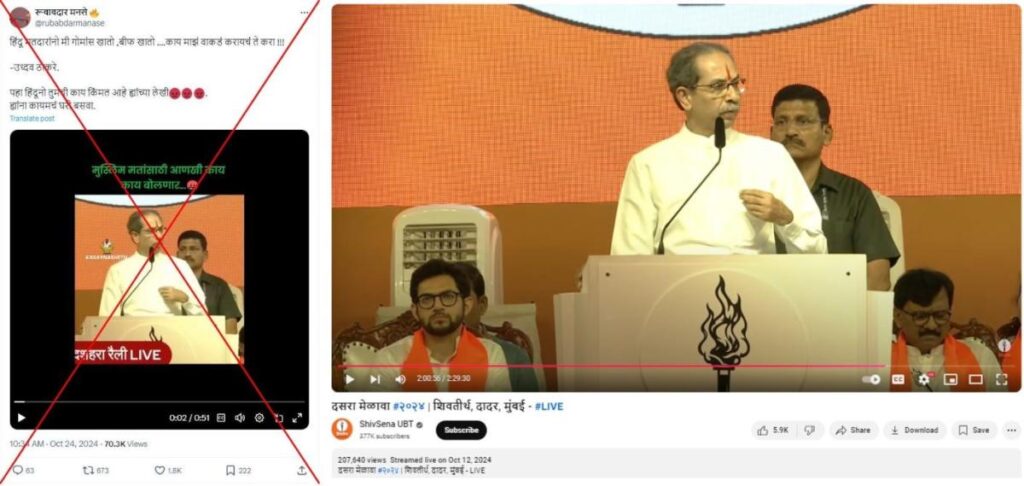As Maharashtra prepared for its Legislative Assembly elections set for November 20, 2024, misinformation circulated through social media platforms like Facebook and X (formerly Twitter). A misrepresented video claimed that Uddhav Thackeray, the leader of the opposition Shiv Sena (UBT), openly declared his consumption of beef. This false claim gained traction, especially in a political landscape where cow veneration holds significant importance due to the beliefs of India’s Hindu majority, and where the slaughter of cattle is prohibited in many states. In reality, Thackeray’s comments were taken out of context. His statements referenced a secular background and pointedly addressed remarks made by Kiren Rijiju—a Buddhist minister in the ruling coalition—who had publicly admitted to enjoying beef. The misleading video was strategically used to sway voters against Thackeray, framing him as someone who undermined Hindu values to cater to a Muslim constituency.
In the distorted portrayal shared widely, Thackeray appeared to proclaim, “I eat beef; eat beef — if anyone can do anything to me, then do it,” alongside accusations from rickshaw drivers labeling his political maneuvers as appeasement toward Muslim voters. These fabricated narratives connected Thackeray to a lineage of criticism from his father, a prominent figure in Hindu nationalism, and sought to paint him in a negative light amidst ongoing concerns about the nurturing of communal divisions in Indian politics. The tension was palpable, with textual overlays on the video accusing Thackeray of seeking Muslim votes specifically and questioning his worthiness as a candidate in the eyes of Hindu voters.
The video that incited this controversy was a composite of two clips, one of which displayed Thackeray invoking Rijiju’s earlier statements about beef consumption. While the video was posted on X and Facebook, it failed to provide any context regarding Thackeray’s intent in mentioning beef. Instead, it sought to exploit societal sensitivities surrounding dietary practices and religious sentiments in India, particularly highlighted by the politically charged environment preceding the elections. The accompanying messages vilified Thackeray further, suggesting his desperation to appeal to Muslim voters could alienate Hindu supporters, effectively deepening the communal narrative.
Verifying the claims proved vital, leading to the discovery of a longer, unedited version of the video uploaded on the official channel of Shiv Sena (UBT) on October 12, 2024. In this original footage, which lasted over two hours, Thackeray indeed referenced Rijiju’s remarks, where he acknowledged being a Buddhist and consuming beef. Moreover, Thackeray’s discourse included a critical reflection on the tragic case of Aryan Mishra, a young man murdered under suspicions of beef smuggling, thereby seeking to highlight contradictions within the ruling party’s stance on cow protection and minority rights. This broader context was essential to fully understanding Thackeray’s statements, as he aimed to contrast the harsh realities faced by individuals attacked based on communal suspicions while simultaneously addressing government policy and hypocrisy.
Thackeray’s actual speech did not include any admissions of his own beef consumption but was instead focused on critiquing the ruling government’s stance on religious freedom and treatment of minorities. By not simply echoing Rijiju’s remarks, Thackeray was appealing to Maharashtra’s electorate, arguing for a more inclusive narrative that recognized the complexity of identity in contemporary India. Yet, the selective editing of the video stripped away this nuance, presenting a dangerous simplification of Thackeray’s political message designed to manipulate voter opinion ahead of the elections.
Historically, events surrounding cow protection in India tend to evoke fervor among Hindu groups, occasionally resulting in violence against individuals accused of cow slaughter, resonating with instances like that of Aryan Mishra. The response of authorities to these vigilante actions and the safety of minorities often come into question in this charged atmosphere. As the elections approached, the dissemination of misinformation like Thackeray’s alleged pronouncement on beef highlights the broader implications of how religious sentiments can be weaponized in Indian politics. Ultimately, such narratives not only pose a threat to the integrity of the electoral process but significantly jeopardize communal harmony, raising urgent questions about the responsibilities of media and platforms in curbing the spread of false information during times of political sensitivity.

